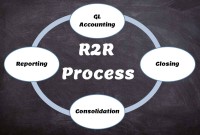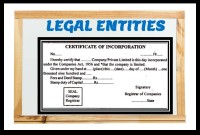- Home
- Business Processes
- Industry Knowledge
- Aerospace Industry
- Automotive Industry
- Banking Domain
- BFSI Industry
- Consumer/ FMCG Industry
- Chemicals Industry
- Engineering & Construction
- Energy Industry
- Education Domain
- Finance Domain
- Hospitality Domain
- Healthcare Industry
- Insurance Domain
- Retail Industry
- Travel and Tourism Domain
- Telecom Industry
- Leadership Skills
- eLearning
- Home
- Functional
- General Ledger (Record to Report)
- Company Form
Company Form
A Company (also called corporation) may be understood as an association of persons in which money is contributed by them, to carry on some business or undertaking. Persons who contribute the money are called the shareholders or the members of the company. A corporation is an artificial being, invisible, intangible and existing only in contemplation of law. Being the mere creature of law, it possesses only those properties which the charter of its creation confers upon it.
Definition of Company/Corporation
A Company (also called corporation) may be understood as an association of persons in which money is contributed by them, to carry on some business or undertaking. Persons who contribute the money are called the shareholders or the members of the company. A corporation is an artificial being, invisible, intangible and existing only in contemplation of law. Being the mere creature of law, it possesses only those properties which the charter of its creation confers upon it, either expressly or an incidental to its very existence. It is an association of many persons, who contribute money or money's worth to a common stock and employ it for a common purpose. The common stock so contributed is denoted in money and is the capital of the company. The persons who contribute it or to whom it belongs are members. The proportion of capital to which each member is entitled is his share.
Main Features
- Once incorporated, a company assumes the identity of an artificial person
- An incorporated company is a corporate body and by action of law it is treated as a legal person
- The company may sue or be sued by its members/shareholders
- The company can enter into contracts in its own name and likewise may sue and be sued in its own name
- The company is a separate legal entity distinct from its management and shareholders
- Company affairs are managed by a Board of Directors
- A company has perpetual existence and is not effected by the joining, leaving, death, insolvency or insanity of any of its shareholders
- The shares of a Joint Stock company (except private company) are freely transferable
- A private company through its articles may place certain restrictions on the transferability of its shares
- In case of a company limited by share, the liability of the members of the company is limited to the nominal value of
- shares held by them
- Capital for the company is contributed by a number of persons called shareholders
- Large number of shareholder give ability to company to raise large amount of capital
- Shareholder is not the agent of the company or its shareholders and hence he cannot bind company with his acts
- The scope of the business of a company is limited and restricted to what is mentioned in the 'object clause' of its Memorandum of Association. The company cannot take up any new business without changing the object clause.
To summarize shareholders are the real owners of the company, Their liability is limited. They can also transfer their shares to others. Since the shareholders are very large in number, the company cannot be managed by all. They elect a board of directors to manage the company. The destiny of the company is guided and directed by the directors. These directors employ some people to carry on the day-to-day business of the company.
Different types of companies
Statutory Company: A company established by a special Act of the Parliament or State Legislature is called 'Statutory Company'. Such companies are established in special cases when it is necessary to regulate the working of the company for some specific purposes. Examples of such corporations are Central Banks etc.
Chartered Company: A company which is incorporated under a special Royal Charter granted by the Monarch is called a 'Chartered Company'. It is regulated by the provisions of that charter. Examples are: British East India Company, Bank of England, Hudson's Bay Company, etc.
Unlimited Company: A company in which the liability of the members is unlimited, is called 'Unlimited Company'. At the time of winding up of the company shareholders have to pay, if necessary, from their personal assets to clear the company's debts. Such companies are very rare.
Companies Limited by Guarantee: In the case of some companies, members give guarantee for the debts of the company up to a certain limit in addition to the amount of shares held by them. The additional amount guaranteed by the members is, generally, laid down in the Memorandum of Association. Such companies are not formed for the purpose of profit. They are formed to promote art, culture, religion. trade, sports, etc. Clubs, Charitable organizations, trade association, etc. come under this category.
Companies Limited by Shares: In this case the liability of the members is limited to the amount of the shares held by them. A shareholder can be called upon to pay only the unpaid amount of shares held by him and nothing more. Most of the companies come under this category.
Private Limited Company: A private limited company means a company which by its article restricts the right to transfer its shares; limits the number of its members; and prohibits any invitation to the public to subscribe for any shares or debentures of the company.
Public Limited Company: A public limited company is one which is not a private limited company. The right of the shareholder to transfer his shares is not restricted and it can invite public to subscribe for its shares and debentures.
Government Company: A company in which not less than 5 1 per cent of the paid up share capital is held by the Central Government, or by any State Government or jointly by Central and/or State Governments.
National Company: When the operations of a company are confined within the boundaries of the country in which it is registered, such a company is called a national company.
Multinational Company: When the operations of a company are extended beyond the boundaries of the country in which it is registered, such a company is called a multinational company. It is also called 'transnational company'.
Foreign Company: Foreign Company refers to a company that operates in the foreign country outside the country of its registration.
Holding and Subsidiary Company: A subsidiary is a company that is completely or partly owned by another company known as holding company.
Related Links
You May Also Like
-
Defining Organizational Hierarchies
A hierarchy is an ordered series of related objects. You can relate hierarchy with “pyramid” - where each step of the pyramid is subordinate to the one above it. One can use drill up or down to perform multi-dimensional analysis with a hierarchy. Multi-dimensional analysis uses dimension objects organized in a meaningful order and allows users to observe data from various viewpoints.
-
GL - Accrued / Unbilled Revenue
Accrued revenues (also called accrued assets) are revenues already earned but not yet paid by the customer or posted to the general ledger. Understand what we mean by the terms accrued revenue, accrued assets, and unbilled revenue. Explore the business conditions that require recognition of accrued revenue in the books of accounts and some industries where this practice is prevalent.
-
Prepayments and Prepaid Expenses
Prepayments are the payment of a bill, operating expense, or non-operating expense that settle an account before it becomes due. Learn the concept of prepaid expenses. Understand the accounting treatment for prepaid expenses. Understand the concept by looking at some practical examples and finally learn the adjusting entry for these expenses.
-
Concept of Representative Office
A representative office is the easiest option for a company planning to start its operations in a foreign country. The company need not incorporate a separate legal entity nor trigger corporate income tax, as long as the activities are limited in nature.
-
Record to report (R2R) is a finance and accounting management process that involves collecting, processing, analyzing, validating, organizing, and finally reporting accurate financial data. R2R process provides strategic, financial, and operational feedback on the performance of the organization to inform management and external stakeholders. R2R process also covers the steps involved in preparing and reporting on the overall accounts.
-
Shared Services is the centralization of service offering at one part of an organization or group sharing funding and resourcing. The providing department effectively becomes an internal service provider. The key is the idea of 'sharing' within an organization or group.
-
McKinsey 7S Framework is most often used as an organizational analysis tool to assess and monitor changes in the internal situation of an organization. The model is based on the theory that, for an organization to perform well, seven elements need to be aligned and mutually reinforcing.
-
Driving Business Efficiency through Divisions and Departments
In case of a multi-divisional organizational structure, there is one parent company, or head-office. And that parent owns smaller departments, under the same brand name. Dividing the firm, into several self-contained, autonomous units, provides the optimal level of centralization, in a company.
-
A legal entity is an artificial person having separate legal standing in the eyes of law. A Legal entity represents a legal company for which you prepare fiscal or tax reports. A legal entity is any company or organization that has legal rights and responsibilities, including tax filings.
-
An organizational design is the process by which a company defines and manages elements of structure so that an organization can control the activities necessary to achieve its goals. Good organizational structure and design helps improve communication, increase productivity, and inspire innovation. Organizational structure is the formal system of task and activity relationships to clearly define how people coordinate their actions and use resources to achieve organizational goals.
Explore Our Free Training Articles or
Sign Up to Start With Our eLearning Courses

About Us
Learning
© 2023 TechnoFunc, All Rights Reserved









